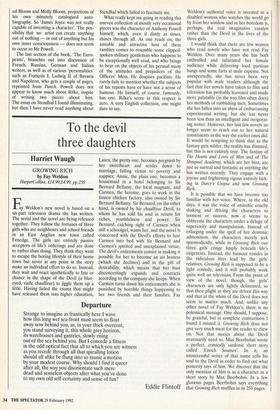To the devil three daughters
Harriet Waugh
GROWING RICH by Fay Weldon HarperCollins, 4.99,£4.99, pp.250 ay Weldon's new novel is based on a six-part television drama she has written. The serial and the novel are being released together. They follow the fortunes of three girls who are neighbours and school friends in an East Anglian new town called Fenedge. The girls are entirely passive acceptors of life's orderings and are done to rather than doing. They think they want to escape the boring lifestyle of their home town but never at any point in the story make an individual effort to do so. Instead, they wait and react apathetically to fate or chance in the shape of the Devil (a blue- eyed, virile chauffeur) to jiggle them up a little. Having failed the exams that might have released them into higher education, Laura, the pretty one, becomes pregnant by her sweetheart and settles down to marriage, falling victim to poverty and nappies; Annie, the plain one, becomes a housemaid in a hotel belonging to Sir Bernard Bellamy, the local magnate, and Carmen, the heroine, goes to work in the frozen chicken factory, also owned by Sir Bernard Bellamy. Sir Bernard, on the other hand, is owned by his chauffeur Devil, to whom he has sold his soul in return for riches, youthfulness and power. Sir Bernard, catching sight of Carmen when still a schoolgirl, wants her, and the novel is concerned with the Devil's efforts to lure Carmen into bed with Sir Bernard and Carmen's spirited and unexplained virtue. The devil's enticements consist in making it possible for her to become an air hostess (which she declines) and in the gift of desirability, which means that her bust disconcertingly expands and contracts according to the company she keeps. When Carmen turns down his enticements she is punished by horrible things happening to her two friends and their families. Fay Weldon's authorial voice is invested in a disabled woman who watches the world go by from her window and in her boredom is, perhaps, the real imaginative 'catalyst rather than the Devil in the lives of the three girls.
I would think that there are few women who read novels who have not read Fay Weldon. Over many years she has both enthralled and infuriated her female audience while delivering loud partisan bangs and some farts at male expense. Not unexpectedly, she has never been very popular with male readers although the fact that her novels have taken to film and television has probably leavened and made more palatable (in the way film often does) her methods of rubbishing men. Sometimes she has fallen into an abyss of embarrassing experimental writing, but she has never been less than an intelligent and invigorat- ing writer. However, her last few novels no longer seem to reach out to her natural constituents in the way the earlier ones did. It would be tempting to think that as the fantasy gets wilder, the reality has dimmed, but this is not entirely true. The fantasy of The Hearts and Lives of Men and of The Shrapnel Academy, which are her best, are just as surreal and fantastic as anything she has written recently. They engage with a joyous and frightening vigour entirely lack- ing in Darcy's Utopia and now Growing Rich.
It is possible that we have become too familiar with her voice. Where, in the old days, it was the voice of anarchic cruelty shaking and driving the characters to torment or success, now it seems to obliterate the characters under a deluge of superiority and manipulation. Instead of enlarging under the spell of her demonic admonition, the characters merely jerk spasmodically, while in Growing Rich our three girls cringe limply beneath life's exigencies. Instead, the humour resides in the ridiculous lives lead by the girls' relatives. Growing Rich is supposed to be a light comedy, and it will probably work quite well on television. From the point of view of the novel, though, the girls' characters are only lightly delineated, so that their plight as they are driven this way and that at the whim of the Devil does not seem to matter much. And, unlike any other novel of Fay Weldon's, there is no polemical message. One should, I suppose, be grateful, but in complete contrariness I found I missed it. Growing Rich does not give very much meat for the reader to chew on. Not that stories about the Devil necessarily need to. Max Beerbohm wrote a perfect, comically sardonic short story called 'Enoch Soames'. In it, an unsuccessful writer of that name sells his soul to the Devil in order to find out what posterity says of him. We discover that the only mention of him is as a character in a short story by Max Beerbohm. In a few glorious pages Beerbohm says everything that Growing Rich muffles in its 250 pages.


















































 Previous page
Previous page